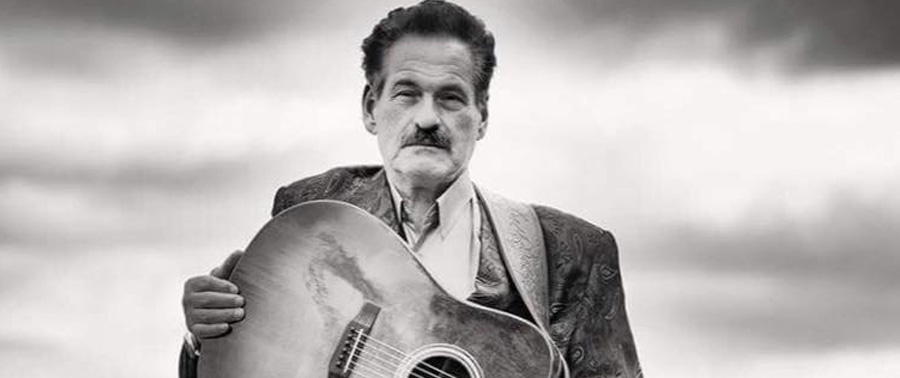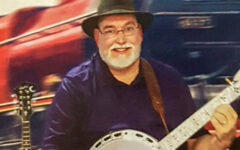
Former Blue Grass Boy banjoist, Bill Simpson, 90, of Oakboro, NC, passed away on September 18, 2024.
In a 2017 interview, the multi-instrumentalist shared with me his history in music. “At twelve years old, my Uncle Jim taught me to play the guitar.”
Simpson began playing with a classmate and cousin. In ninth grade, the trio entered an FFA talent competition playing Poison Love in three part harmony on their guitars.
“We won County and won first at District. He took us to State and we got second place. Allen Shelton won first. His picking really impressed me.”
At age 17, Simpson started concentrating his musical efforts on the five string banjo.
“One weekend when we got snowed in, I tried to make my banjo sound like Earl Scruggs. I liked Scruggs’ style.”
Learning the three-finger style of picking when most local banjoists used two, Simpson shared his knowledge of the banjo with several youngsters in his region of central North Carolina interested in learning that method of playing.
“I taught Terry Baucom. He would come in overalls. He wasn’t old enough to drive, maybe 12 years old. Lloyd (Bauc’s father) would bring him every Saturday.”
Working in Charlotte, Simpson would pass where the Coliseum was being built on Independence Boulevard.
“Bill Price and I decided to go to the first show in the Coliseum. It was a country show with a host of Grand Ole Opry stars that included Ferlin Huskey, Roy Acuff, Ray Price, Minnie Pearl, Kitty Wells, Connie Smith, and Bill Monroe. They brought the whole crowd!” Simpson recalled.
“We paid to go in and went back stage. Bill was back stage tinkering with his mandolin.”
When the Father of Bluegrass found out that the pair picked and had their instruments in their car, he was immediately interested since he was short of band members.
“He only had Joe Stuart on fiddle and Bessie (Lee Mauldin) on bass. He said, ‘Get them out and tune them up.’ We didn’t have no idea that we’d end up playing with him on stage. We played the whole show. I was scared to death. I took a break and people started hollering. They really liked it.”
Following the impromptu show, Monroe asked the young boys about becoming a part of his band, the Blue Grass Boys. They agreed with a few stipulations.
“It took me a couple of weeks to get my business in order,” the newly hired musician stated. “Monroe had us meet him in Hiawasee, GA, at 4:00 on a Friday. We practiced for three hours and played the show at 7:00.”
Driving his ’51 Pontiac, Simpson followed his new employer to his 400 acre farm outside of Nashville. One of the first things that he had to do was join the musician’s union.
“Monroe doubled my salary, paying me $90 a week.”
Traveling in a nine passenger Cadillac, Monroe drove it down sawmill roads hauling Simpson with him to chase foxhounds. His boss man had other passions, too.
“Monroe loved mules. He’d drive across Kentucky to see mules.”
Simpson was introduced to a whole different lifestyle while traveling on the road. “We sang the Opry in the fall of 1956. I was off the farm and dumbfounded with the routine. We played in night clubs. One woman broke a beer bottle and got into a fight with another woman. That wasn’t my thing. I wanted to play bluegrass gospel. I’ve tried to live a clean life.”
While picking with Monroe, Simpson played auction sales, school houses, and even in a courthouse.
“We played in the judge’s stand,” he remembered.
Playing in places like Hazard and Harlan, KY, and all over TN, Simpson decided to quit while the band was performing in Michigan.
“We were almost to Canada. I was the baby in our family. Mama really missed me and said that she was coming to get me. I left Monroe because Mama wanted me to come home.”
Simpson returned with her to North Carolina, married, and had four children. He continued to play music locally and worked on banjos. His vocation as an expert machinist provided him the means to build banjo parts and do luthier work, particularly in the area of banjo rims and tone rings. He built wooden tone rings for many pickers to replace the heavy ones traditionally found inside banjos made in the 1970s. His banjo bridges made from maple, ebony, and other hardwoods, are regarded as some of the best by many area banjoists.
Ben Greene, banjoist and longtime member of Lorraine Jordan & Carolina Road, paid homage to his pickin’ pal. “He was a genius on fixing and working on instruments, and always had time to spend with you. He was a good friend. He will certainly be missed.”
A graveside service to honor his life will be held on Sunday, September 22, 2024, at 3:00 p.m. in the Oakboro Cemetery. The family will receive friends at the Oakboro Cemetery located on Hwy 205 (north of Oakboro), from 2:00 until 3:00 p.m. prior to the service.
R.I.P., Bill Simpson.








